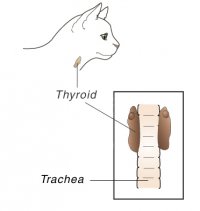Hyperthyroidism is the most common endocrine (hormonal) disorder of cats. It most commonly affects older cats and is caused by an increase in the production of thyroid hormones from the thyroid glands in the neck.
Clinical signs
There may be a combination of clinical signs which can develop gradually. 
- Weight loss
- Increased appetite
- Hyperactivity and restlessness
- Increased heart rate
- Increased thirst and urination
- Slight increase in body temperature
- Occasional vomiting
- Increased defecation
- Panting
- Coat becomes greasy and unkempt
Diagnosis
A full clinical examination will be performed by your veterinary surgeon. This will include palpating the thyroid glands. With hyperthyroidism, one or both thyroid lobes are enlarged and can often be felt as a small firm mass in their neck. Occasionally in some cats there is no enlargement of the thyroid as the overactive tissue is present in an unusual site often within the chest cavity.
To confirm hyperthyroidism a blood test is performed to measure the level of thyroid hormones in the blood. Other laboratory tests may also be performed as thyroid hormones have effects on virtually all the organs in the body. For example liver enzymes are commonly increased secondary to hyperthyroidism and routine blood and urine tests are usually advised to help rule out any concurrent diseases. Depending on the clinical examination of your cat, a blood pressure reading may also be recommended.
In occasional cases, hyperthyroidism may be suspected due to clinical signs, but blood testing may confirm a normal thyroid hormone (T4) concentration. A repeat test may be necessary and additional investigation may be needed to confirm or rule out hyperthyroidism.
Treatment
There are four main options for treating hyperthyroidism. Each have advantages and disadvantages and your veterinary surgeon will discuss which option best suits you and your cat.
1. Medical Management
This method involves giving daily anti-thyroid drugs in tablet form to reduce the production and release of the hormone from the thyroid gland. This does not cure the condition but provides control of the hyperthyroidism.
Once your cat has started on the medication, the thyroid hormone concentrations fall to within normal ranges and the treatment dose is adjusted according to your cat's response. Repeat blood tests are required at recommended intervals to ensure the levels stay within normal ranges. Tablets are required for the rest of your cat's life.
2. Surgical Management-Thyroidectomy
Surgical removal of the affected thyroid gland can provide a permanent cure for hyperthyroidism. This is common surgery performed with a good success rate. To reduce anaesthetic and surgical complications we always recommend where possible that your cat is stabilised on the anti-thyroid medication for a few weeks before surgery.
Occasionally your cat may require both lobes to be removed. This surgery can affect the parathyroid glands situated very close to the thyroid gland. These have a crucial role in maintaining blood calcium levels. To minimise the risk associated with this surgery, your cat may be hospitalised following a bilateral thyroidectomy to monitor their calcium levels or the surgery may be performed in two stages, removing the most affected lobe first.
3. Radioactive Iodine Therapy
Radioactive Iodine therapy is performed at a referral specialist veterinary practice. An injection of radioactive iodine is administered as a single injection under the skin. The iodine is then absorbed by the abnormal thyroid tissue but not by any other tissue. The accumulation of the radioactive iodine destroys the affected tissue without damaging any of the surrounding tissue or parathyroid glands.
This is a curative treatment without serious side effects and does not require an anaesthetic. It does however involve a radioactive substance which while not harmful to your cat, does present risks to people who come in to contact with them. For this reason your cat needs to be hospitalised without visitors until the level of radiation has decreased to acceptable levels. This can be between 3 and 6 weeks.
4. Dietary Management
Recently a leading pet food retailer has manufactured a diet which if fed as the sole source of nutrition can support your cat's thyroid health without the need for medication or surgery. The diet restricts the amount of dietary iodine available to your cat's thyroid gland, therefore limiting the necessary ingredient needed to overproduce the thyroid hormone. Regular monitoring and blood tests are still required to check the thyroid levels remain within acceptable limits.
If you would like any more information on dietary management or any of the other treatment options available please contact your veterinary surgeon at your local branch of Cinque Ports Vets.
For more information please read 'Vidalta Owner Leaflet.'




